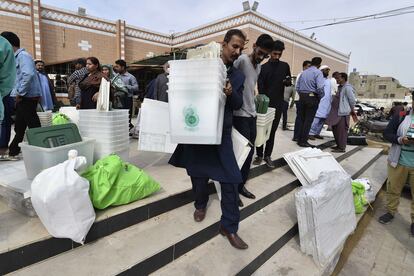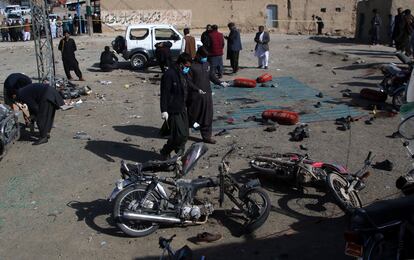Pakistan goes to the polls in a climate of violence and political division
Two attacks in the conflictive region of Balochistan, bordering Iran and Afghanistan, caused at least 29 deaths on the day before the elections


In this mega-election year, marked by the possible movement of chips on a large part of the geopolitical chessboard, one of the countries going to the polls is Pakistan. The nuclear-armed nation and the fifth most populated country in the world with some 250 million inhabitants is holding a general election on February 8, which will determine the composition of the parliament that will be responsible for electing the next prime minister. The scenario, in short, is turbulent. The campaign has been marked by the judicial persecution of Imran Khan — the winner of the previous elections, who has been disqualified as a candidate and jailed — and the return of the self-exiled former prime minister Nawaz Sharif, reinstated to candidacy having been previously banned from holding public office, as the probable winner. In the background, a growing spiral of violence. On the eve of the polls, two explosions outside political offices in the volatile region of Baluchistan, bordering Iran and Afghanistan, left at least 29 dead and more than 50 wounded. The Islamic State has claimed responsibility for the attack. Another attack in the province of Khyber Pakhtunkhwa, which also borders Afghanistan, injured another five people.
The political atmosphere is tense and polarized in one of the most tempestuous countries in the world. Around 700,000 troops and security personnel are expected to be deployed. The border crossings with Iran and Afghanistan will remain closed, according to Reuters. More than half of the polling stations in the country, which will also elect regional legislative assemblies, have been declared at risk of attacks, reports the EFE news agency; the figure rises to up to 80% in Baluchistan, a key province for China’s growing interests in the country — it is a transit area for the New Silk Road, Beijing’s infrastructure megaproject — where militia activity has intensified in recent times. In January, a missile exchange between Iran and Pakistan against insurgents in these borderlands threatened to export the Middle East crisis to Asia.
The nearly 128 million citizens called to the polls have a choice between options that carry with them a troubled legacy of political turmoil, corruption allegations, and convictions. The nation, which also has border disputes with India, albeit recently quelled, remains mired in a post-pandemic economic crisis with galloping inflation and, while China’s presence is increasing, is in the process of redefining ties with the United States following the departure of U.S. troops from Afghanistan.
The likely winner of the vote is Sharif, 74, a Pakistan Muslim League candidate who has been elected prime minister three times but has never managed to finish a term. He resigned from office for the last time in 2017, hemmed in by corruption investigations that ended in prison sentences and political disqualification for life. After fleeing Pakistan and spending four years in self-imposed exile, he returned last October, where the political tables had turned and the winds had become favorable. He appealed his convictions, which were overturned in December, and shortly thereafter filed his candidacy for the National Assembly in Thursday’s elections.

The imprisoned candidate
The second party in the race, the Pakistan Movement for Justice (Pakistan Tehreek e Insaf, or PTI), is a shadow of its former self. Its leader, the former prime minister and national cricketing star Khan, 71, is in prison and convictions continue to pile up against him. Numerous PTI candidates have also been imprisoned in criminal or terrorism cases, which they claim are politically motivated. Those who are running are doing so as independents, after the Electoral Commission banned the party from using its emblematic symbol, a cricket bat (the image is key in a country with a high illiteracy rate). The rallies they hold are dispersed by the police.
A PTI victory would be quite a surprise. The grouping has been fading since the elections it won in 2018, although Khan remains a valued politician, especially among the younger population, and his influence is projected onto the polls.
With the leader behind bars, the party has used a groundbreaking formula to spread its message: campaign videos in which Khan speaks from prison, using a voice cloned by artificial intelligence. “Our party is not allowed to hold public rallies,” he denounces in a message picked up by Reuters. “Our people are being kidnapped, and their families are being harassed.”
Among the other formations in the fray is the Pakistan People’s Party, heir to a political dynasty. It is led by Bilawal Bhutto, 35, son of Benazir Bhutto — the country’s first female prime minister, who was assassinated in 2007 — and grandson of former prime minister Zulfiqar Ali Bhutto.
The elections are partly reminiscent of those of 2018, but in reverse. Then, with Sharif pursued by justice and on the run abroad, Khan won at the polls after having managed to engage a good part of the electorate, especially young people and the educated sectors of Pakistani society. But, once in charge, he came into conflict with the country’s powerful military, whose influence continues to be decisive. He was removed from power in a parliamentary no-confidence motion in 2022 and replaced by the brother of the former prime minister, Shahbaz Sharif, paving the way for the return of the self-exiled Nawaz. In his downfall Khan claimed there was an alleged military plot to overthrow him, with the blessing of the United States. A wave of protests broke out, leading to riots and thousands of arrests. He was jailed in 2023 and has been sentenced for corruption, violating the official secrets act, and illegal marriage. He has been convicted three times in the last week alone, and still has several cases pending before the courts.
The office of the United Nations High Commissioner for Human Rights (OHCHR) has expressed its concern about the elections. The agency’s spokesperson Liz Throssell on Tuesday denounced at least 24 attacks by armed groups against members of political parties in the run-up to the elections. She said OHCHR was “disturbed” about “the pattern of harassment, arrests and prolonged detentions of leaders of the Pakistan Tehreek e Insaf (PTI) party and their supporters,” as well as the multiple court cases against Khan. “We expect the higher courts will carefully review these conclusions in line with applicable due process and fair trial rights,” she said.
Sign up for our weekly newsletter to get more English-language news coverage from EL PAÍS USA Edition
Tu suscripción se está usando en otro dispositivo
¿Quieres añadir otro usuario a tu suscripción?
Si continúas leyendo en este dispositivo, no se podrá leer en el otro.
FlechaTu suscripción se está usando en otro dispositivo y solo puedes acceder a EL PAÍS desde un dispositivo a la vez.
Si quieres compartir tu cuenta, cambia tu suscripción a la modalidad Premium, así podrás añadir otro usuario. Cada uno accederá con su propia cuenta de email, lo que os permitirá personalizar vuestra experiencia en EL PAÍS.
¿Tienes una suscripción de empresa? Accede aquí para contratar más cuentas.
En el caso de no saber quién está usando tu cuenta, te recomendamos cambiar tu contraseña aquí.
Si decides continuar compartiendo tu cuenta, este mensaje se mostrará en tu dispositivo y en el de la otra persona que está usando tu cuenta de forma indefinida, afectando a tu experiencia de lectura. Puedes consultar aquí los términos y condiciones de la suscripción digital.








































